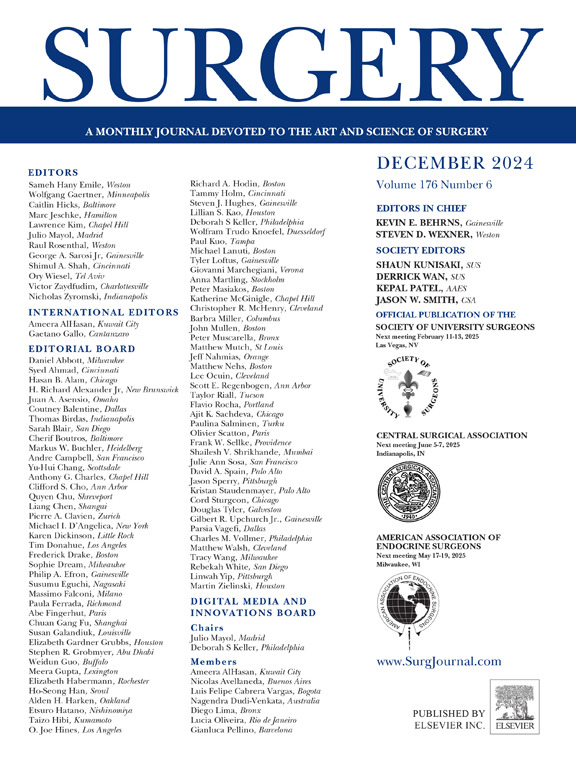护理碎片化对局部晚期直肠癌患者生存的影响:识别弱势群体
IF 2.7
2区 医学
Q1 SURGERY
引用次数: 0
摘要
背景局部晚期直肠癌的治疗需要多学科合作。对病人在多个机构接受癌症治疗的护理碎片化的研究是有限的。本研究旨在确定受护理碎片化影响的人口统计学、临床和医院亚组。方法从国家癌症数据库中选择2009-2019年接受手术、化疗和放疗的II-III期直肠癌患者,分为碎片化护理组和统一护理组。比较总生存率。对人口统计学、疾病特征和医院类型亚组进行分析,以确定护理碎片化的不同影响。结果共纳入63299例患者,其中41978例(66.3%)接受碎片化护理,21321例(33.7%)接受统一护理。中位年龄为60岁(四分位数间51-68岁),62.2%为男性。总体而言,碎片化护理与较短的生存期(P = 0.0017)、增加的治疗延误相关(13.7% vs 12.4%;P & lt;.001),新辅助治疗减少(P <;措施)。在5个亚组中,碎片化护理与生存率降低显著相关:女性患者(校正风险比,1.152,P <;.001)、临床III期疾病患者(调整风险比,1.094,P = .001)、医疗补助患者(调整风险比,1.212,P = .006)、距离医院≥100英里的患者(调整风险比,1.377,P = .013)和在学术中心接受治疗的患者(调整风险比,1.225,P <;措施)。与学术中心的分散护理和非学术中心的治疗相比,学术中心的统一护理与显著提高的总生存率相关(P <;措施)。结论肿瘤碎片化与局部区域直肠癌患者较差的生存预后相关,某些亚组尤其脆弱。解决造成护理碎片化的社会经济和后勤障碍对于改善患者预后至关重要。本文章由计算机程序翻译,如有差异,请以英文原文为准。

Impact of care fragmentation on survival in locally advanced rectal cancer: Identifying vulnerable populations
Background
Treatment for locally advanced rectal cancer requires multidisciplinary coordination. Studies examining care fragmentation, in which a patient receives cancer treatment at multiple facilities, are limited. This study aimed to determine the demographic, clinical, and hospital subgroups impacted by care fragmentation.
Methods
Patients with stage II-III rectal cancer treated with surgery, chemotherapy, and radiation (2009–2019) were selected from the National Cancer Database and divided into fragmented care and unified care groups. Overall survival was compared. Demographic, disease characteristic, and hospital type subgroups were analyzed to determine differential impact of care fragmentation.
Results
In total, 63,299 patients were included, of whom 41,978 (66.3%) received fragmented care and 21,321 (33.7%) received unified care. Median age was 60 years (interquartile range, 51–68 years), and 62.2% were male. Overall, fragmented care was associated with shorter survival (P = .0017), increased treatment delays (13.7% vs 12.4% in unified care; P < .001) and decreased neoadjuvant therapies (P < .001). Fragmented care was significantly associated with decreased survival in 5 subgroups: female patients (adjusted hazard ratio, 1.152, P < .001), patients with clinical Stage III disease (adjusted hazard ratio, 1.094, P = .001), patients with Medicaid (adjusted hazard ratio, 1.212, P = .006), patients ≥100 miles from the hospital (adjusted hazard ratio, 1.377, P = .013), and patients treated at academic centers (adjusted hazard ratio, 1.225, P < .001). Unified care at academic centers was associated with significantly improved overall survival compared to fragmented care at academic centers and treatment at nonacademic centers (P < .001).
Conclusions
Care fragmentation is associated with worse survival outcomes in patients with locoregional rectal cancer, with certain subgroups being particularly vulnerable. Addressing the socioeconomic and logistical barriers that contribute to care fragmentation will be crucial in improving patient outcomes.
求助全文
通过发布文献求助,成功后即可免费获取论文全文。
去求助
来源期刊

Surgery
医学-外科
CiteScore
5.40
自引率
5.30%
发文量
687
审稿时长
64 days
期刊介绍:
For 66 years, Surgery has published practical, authoritative information about procedures, clinical advances, and major trends shaping general surgery. Each issue features original scientific contributions and clinical reports. Peer-reviewed articles cover topics in oncology, trauma, gastrointestinal, vascular, and transplantation surgery. The journal also publishes papers from the meetings of its sponsoring societies, the Society of University Surgeons, the Central Surgical Association, and the American Association of Endocrine Surgeons.
 求助内容:
求助内容: 应助结果提醒方式:
应助结果提醒方式:


